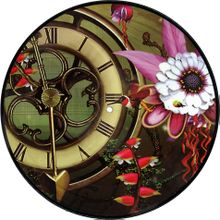|
In this one of many possible worlds,[1] all for the best,[2] or some bizarre test?[3] |

I had considered doing a series on Peart’s lyrics: posting a new song and writing a bit of analysis. I think this is a cool idea, but I’m not sure I have the time to do it justice. Still, I think this song is an excellent final statement from Neil—a simple song that perhaps contains the wisdom of his life.
I see an obvious allusion to Voltaire’s Candide and a repudiation of the philosophical optimism that was popular at the time. At the end of Voltaire’s satire, Candide works in his garden: this is the new measure and meaning of his life—not that for which philosophers live. He has no energy to justify that which he has found is unjustifiable—abstract uncertainties that are the meat and potatoes of philosophers and theologians. Nor does it matter. Even the Watchmaker, if it exists, doesn’t matter ultimately. It’s what we do in this world—what we leave for others—that matters, not what we believe.
notes
- ↑ My brother suggests this is a reference to the many-worlds interpretation of quantum mechanics. I will not say he is incorrect, but it could be more quotidian than that. Certainly Tim’s reading makes the song richer, but I’m not sure it’s supported by the rest of the song or the album. It’s likely a reference to Liebniz’ idea of the best of all possible worlds—especially in the context of my reading.
- ↑ This seems to be an allusion to Pope’s conclusion in Essay on Man: “whatever is, is right.” This is certainly what Voltaire challenged with Candide.
- ↑ Of the Watchmaker below? Perhaps some deity or force we cannot measure.
- ↑ Again, I’m reminded of Candide in his garden, uninterested in any speculation about the nature of the universe, content in only what is before him—what he can make grow.
- ↑ It is because it moves toward our day of death. Here, instead of being a malicious force, it is a figure of black humor. With death as the final outcome, what makes life significant? the song seems to ask.
- ↑ In case you didn’t get the reference to death above, here are a couple more.
- ↑ And we can’t know what they are. God, if there is one, remains pretty silent about his designs. In the album, the Watchmaker is the god-figure that directs the clockwork angels, giving guidance and direction to the people who were “brought up to believe.”
- ↑ To me, this is the wisdom of the song: your life is significant ultimately in how you have influenced others. While Peart does not point his finger at us individually, this is the moment when we need to begin a personal assessment of our kindness and love. “Measure,” too, refers to time and the Watchmaker. We measure time with a clock or watch, and it picks up the over-arcing theme of the album about morality, control, and authority.
- ↑ Here is the direct allusion to Candide. The garden is the central metaphor of the song: it could be family, students, friends, community—all of those we interact with and what we give them of ourselves is what has the capacity for surviving after we die.
- ↑ This could be another reference to the Watchmaker and his creation, and it could also be one for science. Ultimately, in the face of death, is either significant?
- ↑ The theme of time’s constant movement is made clear here. We’re forever pursued by its arrow. It’s constantly moving, making our lives more urgent, with every breath—as he picks up in the next stanza.
- ↑ Here, measure is replaced with “treasure” further emphasizing the importance of one’s influence—of “love and respect.”
- ↑ Here, what he means is made more concrete—our actions and generosity are the measure, and potentially treasure.
- ↑ Perhaps with our generosity, this is all we need or “can expect” from others in return.
- ↑ This reminds me of Buddhism: the only important time is now, for that is where reality is. This last line is enigmatic: does he mean we have no hope? Or, hope is something that remains elusive based on the relentless progress of time? I think it’s probably the former, but rather than being fatalistic, here it’s just stated as a fact by the narrator who is no longer affected by the threat of the relentless progress of time and the eventuality of death.

